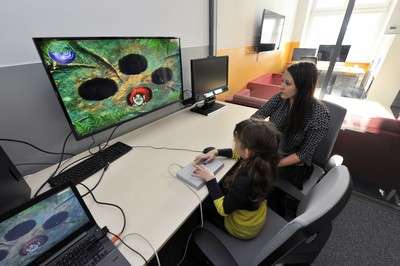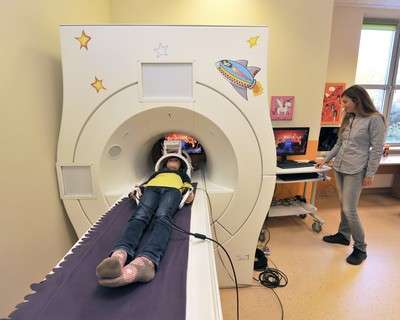Pioneering research on the underlying causes of dyslexia

A unique research project on developmental dyslexia has been launched at the Nencki Institute of Experimental Biology in Warsaw. It is aimed at examining different factors responsible for development of the reading disorder. Children from the first five classes of primary school are encouraged to participate. They will have the chance to play computer games and have fun in a mock scanner.
At a time when people are dominated by intensive mass media, dyslexia becomes even more burdensome. Problems with decoding and comprehension of words make it difficult for people with dyslexia not only to read books, papers or maps, but also to use computer, smartphones, email or internet. Researchers from the Nencki Institute in Warsaw, Poland, have been studying reading difficulties for many years now. A natural follow up of the work was the pioneering research on the causes of dyslexia in children and its treatment, for which the team led by Prof. Anna Grabowska received a prestigious grant MAESTRO from the Polish National Science Centre.
The aim of the project conducted at the Nencki Institute is for a better understanding of the mechanisms responsible for the development of reading disorders in children, with the long-term goal of establishing new methods for early diagnosis and more effective treatment directed at the cause of dyslexia in each individual. Warsaw researchers plan to examine in two waves 530 pupils of the first five primary school classes, including both at risk of dyslexia children and typically developing ones. They are still recruiting participants via website dysleksja.nencki.gov.pl/.
Developmental dyslexia occurs in a dozen or so percent of the population and it does not remit with age or time. In certain people it appears as a consequence of one specific deficit related to brain function, in other cases different subtle impairments can be implicated.

"In our research focusing on the underlying causes of dyslexia, which we are about to begin, we plan to examine this disorder from different perspectives. We intend to investigate the influence of all factors supposed to play a role: cognitive deficits, behavioral symptoms and brain correlates," explains Prof. Grabowska, head of the Laboratory of Psychophysiology.
The main part of the planned research is a series of tests in the form of attractive computer games designed specifically for the purpose of the project. These games engage brain functions potentially impaired in dyslexia. Another experiment will include eye-tracking equipment, which enables researchers to track the position of eyes while children read. The structure and function of the brain will be examined using the first in Poland dedicated only to research 3T magnetic resonance scanner, which was launched in 2013 at the Nencki Instutute, funded by the CePT research infrastructure.
"We made sure that children – the main characters in our project – can feel happy and comfortable", ensures Dr. Katarzyna Jednoróg, the main investigator of the project, and further explains: "Every detail was important, beginning from the interior design colors to the graphics of the computer games. These things had to be appealing to children. We also built a mock scanner where children are trained and accustomed to how they should behave when we record their brain function".

All test and measurements are noninvasive and completely safe, and children treat them as an interesting entertainment, not fully grasping the value of the conducted research.
"During the course of five years of the MAESTRO grant some of the recruited children will be tested a few times. If we diagnose deficits connected to reading difficulties in a child, we will also propose adequate intervention directed to deficient functions and then test its efficacy. We warmly encourage parents from Poland to contact us and enroll their children in the project", says Prof. Grabowska.
Interdisciplinary and complex character of the new series of studies will enable researches from the Nencki Institute to uncover potential subtypes of dyslexia, establish their underlying factors and neuronal markers, as well as lay down more effective methods for assessing early risk factors of reading disorder. Having such knowledge, it would be possible to diagnose the risk for dyslexia even before the symptoms fully develop. Early, comprehensive and objective diagnosis will facilitate the choice of optimal therapy for particular subtype of dyslexia, which if applied early enough, would prevent the development of reading disorder or at least reduce its impact.

















